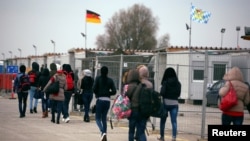German officials have proposed that the European Union relax some human rights safeguards so that more asylum seekers can be deported while awaiting the outcome of their cases, according to a working paper seen by Reuters.
The paper is among many under discussion in Brussels as the EU, which has taken in more than 1.3 million migrants and refugees since the start of 2015, makes it tougher for them to get in and be allowed to stay.
The paper said the proposal would only kick in at times of a "mass influx" of people to the bloc. "This is another element in efforts to energize readmission of people to wherever they came from," said one Brussels-based diplomat.
The EU currently has an agreement allowing the return of asylum seekers only with Turkey. If approved, the proposal could enable such transfers to other places as well, including south of the Mediterranean, diplomats said.
The EU is already talking to Libya, Tunisia and Egypt about curbing immigration to Europe.
While the EU says it has the right to send away all economic migrants if it chooses, its existing laws on human rights say asylum seekers awaiting a ruling on their cases can only be deported to countries that meet certain conditions.
The working paper lists them as including: safety from threat and persecution; humane reception conditions; and at least partial access to medical care, education and the labor market.
Some parts of this "clearly exceed" the basic safeguards stipulated by the Geneva convention on refugees and the European Charter of Fundamental Rights, it said.
It did not specify which of them might be dropped, but made clear that mass expulsions would still be prohibited and receiving countries would still have to guarantee decent living conditions for deported asylum seekers.
They would also have to go on obeying the so-called non-refoulement principle, which means ensuring that people deported by the EU are not pushed further towards places where their lives might be at risk.
Safe zones
Specifically, the proposal also includes an option to recognize certain regions - rather than whole states as is the case now - as fit for people, including asylum seekers, to be sent back to.
EU officials acknowledge they are considering this "safe zones" concept, which could mean sending people back to certain areas of countries otherwise deemed too dangerous.
"These plans are overturning the international law on refugees... This is an utter betrayal, inhumane," Ska Keller, a Green member of the European Parliament, said of the document.
The European Union's executive had no comment on the proposal paper.
The document said: "This is not about building a 'Fortress Europe'. It is about combating illegal immigration, which has already cost the lives of thousands, and about replacing it by a regulated system of legal admissions, combined with humane living conditions, assured by the EU in third countries."
Last year's EU migration deal with Turkey - which includes provisions on sending back asylum seekers who came to Europe via that country - has sharply cut the numbers arriving, and the paper said it should serve as a blueprint for the future.
The Turkey agreement has, however, been criticized by rights groups as cutting corners on human rights and for bumpy implementation they say has put people's lives at risk.
The paper said extending the options for deportation of asylum seekers would discourage people-smuggling. The EU would also provide funds to improve conditions for refugees and migrants sent back to third countries.





